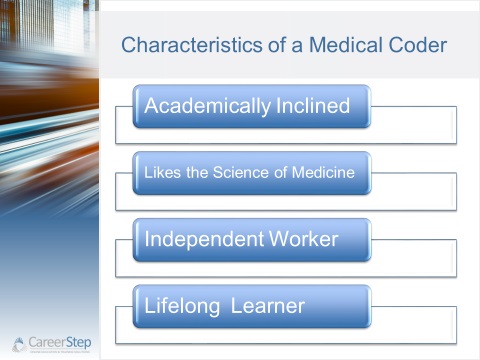Medical Coding: Am I a Good Fit?
Posted on 08.26.2015

When someone is trying to decide whether or not to pursue a career in medical coding, or anything else for that matter, it’s only natural to wonder whether they’ll be a good fit in that profession. Just like other careers, medical coding is better suited to some people than others. We’ve given this a little thought and put together 4 characteristics that are commonly found among those who are good at medical coding and enjoy it as a career.
Someone who is a good fit for medical coding is academically inclined, enjoys the science of medicine, is an independent worker, and is a lifelong learner.
Academically Inclined
Medical coding requires:
- High reading comprehension – A post high school reading level is necessary as the coder will be reading documentation authored by physicians.
- Critical thinking – Coders have to mentally juggle multiple variables to accurately code a patient record. Documentation from different sources must be weighed and evaluated against one another. Coder’s must also be able to transfer learning from one situation to another while still allowing for the individual nature of each unique encounter.
- Research – Often a coder will run across situations where they don’t have enough clinical or coding knowledge to code an encounter completely or accurately. As accuracy and completeness are very important in coding it behooves the coder to find information upon which to base coding decisions that ensure both of these elements. This will often require the coder to search for information out of both hard copy coding references and online sources.
Enjoys the Science of Medicine
Medical coding is firmly centered in healthcare, but it offers the opportunity to participate in the industry without direct patience care. Coders…
- Apply knowledge of medical science to non-clinical processes – Many people may view medical coding as a clerical practice. However, medical coders need a good grasp of anatomy and pathophysiology (among other things) in just the same manner as any clinician. Coders just apply that knowledge to evaluation of the medical record as opposed to the treatment of the patient.
- Are not patient care centered – Medical coding is great for someone who likes the science part of medicine but does not want a patient contact driven career.
Independent Worker
This is important because coders…
- Work without direct supervision – Medical coders work independently at their own desk or sometimes even in their own homes. They may work during times of the day when the supervisory staff is not in the office. Regardless of when or where they work, they must be responsible for getting their work done, even if there is not someone around to prod them along.
- Must meet productivity and accuracy standards – Although the work of medical coders is routinely audited, they must meet productivity and accuracy standards without someone supervising the quantity/quality of their work on a case-by-case basis. They need to proactively self-monitor and adjust if they have problems in those areas rather than waiting for someone to bring the issue to their attention.
Lifelong Learner
One of the most important characteristics of a medical coder is that they are excited about being a lifelong learner. Coding requires constantly educating yourself on…
- Advances in medical science – New diagnoses and procedures are being reported all the time. Coders must be up to date on these changes and how they are reported with codes.
- Changes in policies and procedures – Providers, third party payers, and the coding industry in general occasionally change how they do things, and those changes often affect reimbursement. Coders must keep abreast of these changes in order to coder correctly.
- Career transitions – Many coders like to mix it up and move on to something new and more challenging when current job responsibilities become too routine. This may lead coders to learn how to code for additional specialties or outpatient coders to become inpatient coders. As each type of coding has practices that are unique, changing career focus will require learning new information.
Although obviously not an exhaustive list of characteristics that indicate whether or not someone is a good fit for medical coding, this should give you a general idea of whether or not medical coding is for you. If the job described by the information provided sounds like a prison sentence rather than a challenging way to spend your time, medical coding is probably not your dream career.
CareerStep medical coding graduates: are there characteristics you would add to the list? Share your thoughts in the comments below!
this is a really good article!